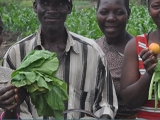Mozambique prohibits Highly Hazardous Pesticides

Mozambique prohibits Highly Hazardous Pesticides
Mozambique has taken important regulatory measures to protect its people and the environment by cancelling the registration of 79 Highly Hazardous Pesticides. Working with the Ministry of Agriculture, FAO (Food and Agriculture Organization of the United Nations) assisted in the process of the prohibition of hazardous pesticides and the promotion of an ecosystem-based approach to pest and pesticide management.
Over the past ten years, the average annual volume of pesticide imports into Mozambique has increased by 500 percent. Agricultural pesticides are used mainly on cash crops like cashew, tobacco, sugar cane, cotton, banana and vegetables. The annual value of pesticide sales is about US$16.6 million. However, some of the products currently in use are highly hazardous.
Highly Hazardous Pesticides (HHPs) are products that present particularly high levels of acute or chronic hazards to human health or the environment due to their inherent chemical properties. Most of these products are no longer permitted in developed countries where new, lower risk pesticides, including bio-pesticides, have become available to producers. Smallholder farmers are generally not in the position to adequately manage risks when handling highly hazardous products. As a result, their uncontrolled use may lead to occupational poisoning.
The Government of Mozambique has issued a declaration to cancel registration of many pesticides that might pose severe risks to human health and the environment. With this declaration, the Government indicates its intension to refuse future registration of similar pesticides.
In 2006, FAO member countries requested help to facilitate risk reduction of pesticides, including the pro-active banning of such products and the promotion of alternative solutions. Since then, a joint FAO and World Health Organization (WHO) expert panel has drawn up a list of criteria to help identify Highly Hazardous Pesticides and FAO has assisted several countries in addressing the risks posed by these compounds. Often, the only effective risk reduction measure is to prohibit a product by cancelling its registration, or by restricting its availability to certain groups of specialised users who have been trained, and are able, to manage the risks.
Source: Fao.org
